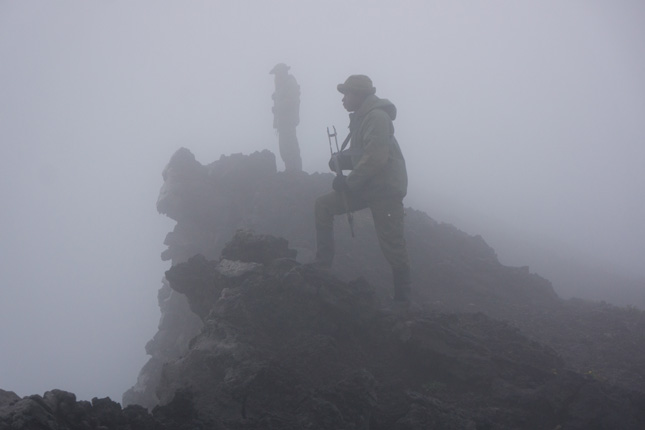-
Environmental Cooperation Can Facilitate Peace Between States
February 27, 2018 By Tobias Ide
Environmental stress and climate change can accelerate instability and conflict—but shared environmental problems can also be a source of cooperation and facilitate peacemaking between states. Transnational environmental problems are common threats and often cross national boundaries, requiring international cooperation to address. In turn, this cooperation can provide a good entry point for building trust and cooperation.
In a recent multi-method analysis published in the Journal of Peace Research, I find that cooperation around transboundary water and conservation facilitates reconciliation between two rival states. To use an ecologically unfriendly metaphor, we can kill two birds — environmental degradation and international tensions — with one stone: environmental peacemaking. However, we can only leverage the peacemaking effect of environmental cooperation under certain conditions.
Successful Environmental Peacebuilding Depends on Context
My study combines evidence from a statistical analysis of more than 3,000 cases, a qualitative comparative analysis of 20 rivalries, and in-depth studies of six cases. It reveals that four conditions are particularly important for successful environmental peacemaking:
- A high degree of environmental awareness, which ensures sufficient political support for environment-related cooperation with rival states;
- Internal political stability, which ensures continuous cooperation, stable expectations, and trust building;
- A low level of recent interstate violence and some ongoing reconciliation, which creates a climate of goodwill that can spillover into environmental cooperation; and,
- A tradition of low-level or informal environmental cooperation through international networks of environmentalists, academics and decision-makers, who can then capitalize on the window of opportunity opened by reconciliation and political stability.
My findings suggest that under these conditions, environmental cooperation can be an effective tool for peacemaking and peacebuilding. Even in hostile political climates, environmental cooperation can help build transboundary networks. Once a process of reconciliation begins, it can be “locked in” by these international networks through in-depth environmental cooperation.
Success Stories: Environmental Cooperation in Virunga and the Middle East
The Virunga Massif, which is shared by the Democratic Republic of Congo, Rwanda, and Uganda, offers a good example of these dynamics. While rich in biodiversity, the transboundary region is under a high level of environmental stress due to a lack of proper regulations. With the support of international donors, local conservation agencies and NGOs began cooperating in the 1990s.
Cooperative networks survived severe tensionsThese cooperative networks survived severe tensions between (as well as within) the three countries in the mid-1990s and again around the turn of the millennium. After political stability increased in the mid-2000s, conservation actors in all three countries pushed to formalize and intensify transboundary efforts to protect the Virunga Massif. The resulting cooperation provided opportunities for high-ranking decision-makers to work together on “win-win” situations and catalyzed new trust-building processes. It also demonstrated that cross-border cooperation was politically feasible in the region.
Another example, EcoPeace, facilitates cooperation between Israelis, Jordanians and Palestinians by helping them work together to address their shared environmental challenges. Today, tense political relations prevent such cooperation from having a wider impact on international relations. But the transnational civil society and academic networks might well have a peacemaking effect once broader processes of reconciliation are under way.
A Positive Alternative to the Environmental Conflict Debate
Almost two decades ago, Ken Conca and Geoffrey D. Dabelko (now ECSP’s Senior Advisor) published a groundbreaking edited volume on environmental peacemaking. Subsequent research in the field focused on peace parks, post-conflict environmental peacebuilding, and disaster diplomacy.
But while we know a decent amount about the impact of environmental stress and climate change on violent conflict, few studies have examined peaceful adaptation to environmental problems, including the positive effects environmental cooperation can have on trust, understanding, and interdependence (or perceptions of it). However, there are several excellent studies of successful cases in East Africa or the Middle East and of some failed projects (in Central America, for example).
To address today’s global trends like climate change, biodiversity loss, freshwater depletion, and soil degradation, we need to understand whether and how transboundary cooperation can help, and therefore we need more cross-case, comparative research on environmental peacebuilding. My study begins to address this gap by finding that under certain circumstances, environmental cooperation can facilitate reconciliation between rival states. I hope that not only will this help inform policymakers, environmentalists, and peacebuilding practitioners, but also stimulate further research.
Tobias Ide is coordinator of the Peace and Conflict research field at the Georg Eckert Institute in Brunswick (Germany). He was recently a visiting researcher at the School of Geography at the University of Melbourne. Further information on his work can be found here and here.
Sources: Disaster Diplomacy, Earth System Dynamics, Ecopeace, Environmental Peacebuilding, “Environmental Peacebulding,” edited by Ken Conca and Geoffrey Dabelko, Geoforum, Journal of Peace Research, The MIT Press, Third World Quarterly
Photo Credit: Rangers in Virunga National Park, Democratic Republic of Congo, April 2015, courtesy of Fanny Schertzer
 A Publication of the Stimson Center.
A Publication of the Stimson Center.






